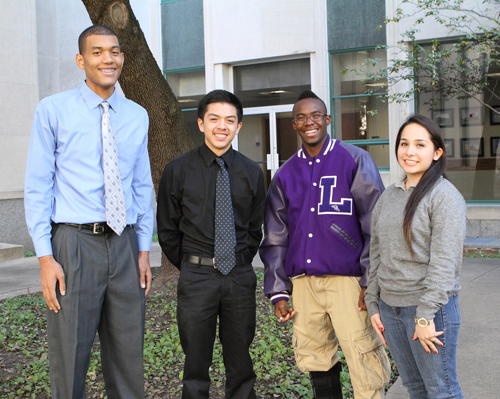
Since the Home Rule Commission is going to take its sweet time figuring out what a home rule charter should contain (or if the status quo is hunky-dory with them), I figure I’d offer some suggestions. I offer these as intellectual fodder, in the hopes that someone will go to an HRC public hearing and offer an idea that could ultimately help kids instead of espousing the paranoid-fantasy beat-down of the status-quo crowd. So, here’s the first in an occasional series.
Idea No. 1: a student trustee.
There are several school systems around the country that have a student position designated on the governing board. I know. Seems weird, right? You imagine some sideways-hat-wearing Bieber fan asking Elizabeth Jones for dap and begging Mike Morath to finish his math homework. But just because YOU were a waste of space in high school doesn’t mean all kids are. In fact, smart kids have some say in how we serve them in several cities. For example, here, here, and here.
Not to suggest this idea is a slam-dunk. It contains many pros and cons. This Atlantic piece has a pretty good take on the issue. And the national advocacy organization SoundOut exists solely to change governance systems so that students can participate. I have to assume that since Home Rule is the only way for we in Dallas ISD to allow for a student board member with any kind of actual participation rights (closed session, voting, etc), that SoundOut must be a home rule supporter. Who knows, though? The Texas Organizing Project, which says its mission is to give low- and moderate-income people more of a say in their community, is opposed to Home Rule. I suppose they’ve convinced themselves that evil billionaires, who themselves attended low-income Dallas ISD schools, are a threat to the wonderful status quo.
But I digress. Okay, here are some pros and cons to this idea:
Pros:
- A student will likely help increase the focus of the board on the needs of students.
- A student can, in theory, improve the ability of other board members to connect policy and programmatic decisions with student outcomes.
- Having a student at the table will lead to a more inclusive decision-making processes, helping to increase buy-in (especially for controversial decisions).
Cons:
- Students may lack the mental maturity to make the complex trade-offs required governing a $1.7B educational system.
- Students could end up providing a passionate voice that is irrelevant to the core topics at hand, slowing down the agenda (so it would be just like adding another crappy board member).
- An individual student could suffer real conflicts of interest, like when faced with a decision that could harm some of his/her classmates to the benefit of others.
Even if we feel the pros outweigh the cons, there are other considerations to make with any student board member. Should the student have voting rights? In most places that have tried this, the answer is no. In some places, the student has the right to vote on certain board items but not others. For example, the commission could give the student the right to vote on board policies, but not any other matters (procurements, budget/tax rates, superintendent’s evaluation/contract). It seems you’d want to make sure the student had access to closed session discussions. You may want to ensure the student has full access to all the other information a board member has, with the possible exception of individual student data.
The commission would also need to consider how the student makes it onto the board. One-year terms, and only a rising senior is eligible? Two-year terms, so rising seniors wouldn’t be eligible? Dallas ISD has a pretty vibrant teen board. Is the president of the Dallas ISD teen board made the student representative? Or do you build in some failsafe mechanism? For example, the teen board nominates a candidate, but the superintendent or board prez ratifies (i.e., has a veto, to allow for at least a basic interview independent of the teen board’s process to ensure the student is prepared for the commitment).
There’s a lot to consider, obviously. But after researching this, and after slogging through a few months of board meetings/briefings, I think this could be a very good thing for our district, for one major reason I didn’t cite above. Imma highlight one quote in particular from a policy brief prepared by the Education Commission of the States:
“In some cases the dynamic within a policymaking body may be changed for the better by the presence of students, since members may feel obliged to be less confrontational, to articulate their arguments about the issues more clearly, and to come to agreement through honest deliberation.”
Ahem: EXTA-EFFING-LY. As entertained as I am by trustee dysfunction, I’m convinced it ultimately hurts kids. I’ve attended board meetings where I’ve heard Bernadette Nutall yelling at other board members from the closed session room. I’ve seen Elizabeth Jones repeatedly ride staff’s ass with an unnecessary accusatory tone, sending them on data-gathering goose chases and basically addressing them like children. (And I know top-level people have left because they rightly thought, “I don’t need this shit.”) How would that change if we put one of our high schoolers up there with those board members? Perhaps not at all. But, perhaps, just perhaps, after a colleague disagrees with a substantive point, instead of unleashing hell on said colleague that trustee will see the bright innocent eyes of a teen board member — an example of those kids said trustee has sworn an oath to serve — and instead respond with: “I disagree, and here is why.”
That may seem like a small thing. I submit to you it is not. I suggest it is vital if the board, which is the rudder that guides this huge ship, is ever going to unanimously act like a board should act. That is a goal worthy of this entire enterprise.



